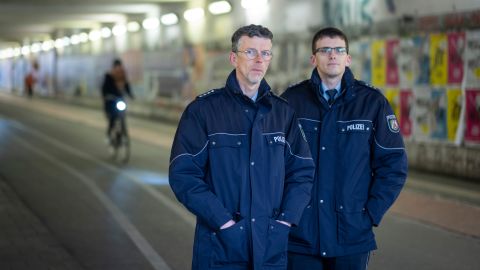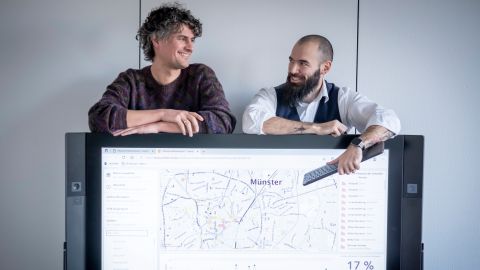The early detection of hotspots was the aim of Münster police headquarters. The impetus for this came from various events in 2021, when young people developed meeting places in several locations, some of which were loud, aggressive and drunk, causing littering and disturbances. "We received an increasing number of complaints about the hustle and bustle. Residents were worried about their safety and were already avoiding the places," reports Lothar Foecker. The 56-year-old officer is head of Department 2 (Controlling and Strategy) at Münster Police Headquarters, which is part of the Hazard Prevention/ Operations Directorate.
In addition, the authority sent more patrols to the affected areas and the police officers repeatedly dispersed the crowds, although they were regularly accosted during their patrols. Here and there, bottles were thrown at the officers. The offenses became more frequent.
"A meeting place for posers, tuners and speeders from the Ruhr area had also established itself around Lake Aa in Münster," says Foecker's colleague Holger Stadtländer. "We were extremely worried about the extent of it," says the 36-year-old police chief inspector. It was only after a massive deployment of forces that the area was pacified in the second half of 2021.
However, the police headquarters were not satisfied. The idea arose of being better prepared against the sudden occurrence of crime in the city. Observations and information on crimes should be processed promptly and comprehensively.
The police headquarters wanted to get in front of the situation with the municipality and pool security-related findings. Foecker and Stadtländer, who are coordinating the project in Münster, contacted the LKA in February 2022. "It was supposed to network all the important data for us and provide visualizations so that we could react immediately."
The contact persons for the Münster team are Chief Superintendent Kai Seidensticker and government employee Jannis Heil from the Criminalistic-Criminological Research Center (KKF) of the LKA in Düsseldorf. Seidensticker, who studied criminology alongside his police service and holds a doctorate in the subject, is head of the KKF's "Specialist Council for Spatial Crime Analysis and Situation Anticipation" (SKALA). Heil, who holds a doctorate in agricultural science, is a specialist in modeling. Her first questions to the Münster team were: "What do you want to achieve? And what can we contribute?"
The two sides very quickly came to the conclusion that the first step was to identify the changing hotspots in the city. Seidensticker and Heil set about locating the various crimes on small-scale maps and linking them to increased deployment measures, citizen complaints and observations. The results are visualized in the geoportal of the North Rhine-Westphalia police, which was set up by the State Office for Central Police Services (LZPD) together with the LKA.
Now red hexagons mark the highest alert level. If it gradually becomes uncomfortable in an area, this is marked in orange. If calm slowly returns, the color changes to yellow. Current data is provided daily by the police and the municipal public order service.
The graphics provide a clear but differentiated picture. Individual events can also be called up on background maps. Red and blue dots then appear, for example, symbolizing the offences and police operations. "If you click on them, you get more detailed information about what happened," explains Jannis Heil. However, if you only want a brief highlight, you don't have to look far. "Similar to a hit parade, we have defined 25 top hotspots." They are each based on the findings collected over the past four weeks.
The crimes - from burglary and assault to traffic violations - are weighted by the Münster police headquarters. A robbery counts more than a disturbance. "The geodata analysis is now carried out on a weekly basis," says Kai Seidensticker. "It took a few months to develop the method and implement it technically." In future, the calculations will be carried out automatically without KKF having to intervene.
"We have taken a big step forward," enthuses Lothar Foecker about the opportunities offered by the diagnostic tool, which enables cause and effect analyses and precise management of the emergency services for his city. "We are thus strengthening public safety. By recognizing and understanding dangers in good time, we can initiate countermeasures before crime becomes entrenched."
The tool is framed by a four-stage concept of measures. Level 0 simply means "nothing going on or nothing known". Level 0+ indicates a temporary hotspot where each directorate is responsible for deciding how to proceed. Level 1 means that a cross-directorate approach is taken, for example with a raid or a large-scale traffic check. Level 2 is designed for the longer term: A special organizational structure (BAO) is set up and the competencies of various agencies are bundled under a single management. As with the BAO Wind, when the station district of the university city threatened to tip over. There are many conceivable accompanying measures - from video surveillance to undercover investigations.
"We want to avoid people no longer entering certain places because they are simply afraid to go there," emphasizes Holger Stadtländer. "It's important to work together with the district officers, who are a bit like the local security guards used to be. They find out which schoolyards are frequented by young people in the dark, where they listen to loud music and scribble or when and where people are dealing in parks." The security service can specifically check such feedback. "We have set up permanent sponsorships to institutionalize such cooperation." Citizens should not feel threatened.
The Münster pilot project is running, but is far from complete. The next step is to transfer the dashboards with the localization of criminal incidents to police cell phones. This will allow people to stay up to date on the move. The social networks are also to be analyzed using keywords. "In this way, we can find out a lot of things that could concern us in the near future," believe Lothar Foecker and Holger Stadtländer. Münster is not just a city of bicycle thefts. "We have developed something that allows the police to get in front of the situation."

